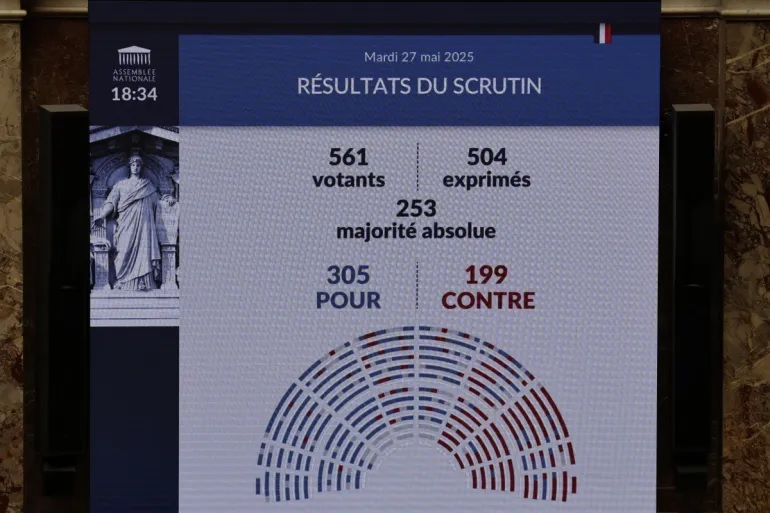France’s parliament on Tuesday, May 27, 2025, took a significant step toward legalizing assisted dying, with a majority vote in favour of the bill.
The bill, campaigners say, could create one of the most tightly regulated systems in Europe.
In a highly emotional session, lawmakers in the National Assembly approved the first reading of the bill by 305 votes to 199.
Additionally, the chamber unanimously backed a separate, less controversial law guaranteeing access to palliative care in specialist end-of-life facilities.
These initial votes mark the beginning of a lengthy legislative process.
Both proposals must now be reviewed by the Senate (France’s upper house) before returning to the National Assembly for a second reading.
As a result, the final legislation is unlikely to be enacted before 2026.
The French government has described the right-to-die bill as a moral and ethical response to the suffering of terminally ill patients.
It argues that the proposal is not about introducing a new freedom but about balancing respect for human dignity with individual autonomy.
The proposed law would enable medical professionals to evaluate a patient’s eligibility to access a lethal substance if the patient has clearly expressed a desire to end their life.
If the patient is physically unable to self-administer the substance, a nurse or doctor could administer it instead.
The legislation includes several strict criteria for eligibility.
Patients must be at least 18 years old, either French citizens or legal residents, and must suffer from a serious, incurable, and life-threatening condition that is advanced or terminal.
The illness must also be irreversible and cause constant, unbearable physical or psychological pain that cannot be alleviated through existing medical treatment.
Additionally, the patient must be capable of expressing a free and informed decision.
Though commonly referred to as “assisted dying” or “euthanasia” in public discourse, the bill uses more neutral terms like “aid in dying” or “end-of-life law.”
It uses these to reflect the government’s cautious approach.
President Emmanuel Macron’s centrist coalition and several left-wing lawmakers supported the bill.
On the other hand, most right-wing and far-right deputies opposed it.
Lawmakers from all parties were allowed a free vote based on personal convictions.
This reflected the deep ethical and cultural sensitivities surrounding the issue, especially in a nation with strong Catholic roots.
Socialist MP Stéphane Delautrette said during the debate that “the French people are ready for this.”
He called the proposed legislation a historic milestone in France’s social progress, on par with the legalisation of abortion and the abolition of the death penalty.
However, some conservatives expressed serious reservations.
Patrick Hetzel, a deputy from the centre-right Les Républicains, argued that legalising assisted dying without ensuring universal access to palliative care was both premature and dangerous.
Prime Minister François Bayrou, a devout Catholic, said he personally had “questions” about the bill and would have abstained if he were voting in parliament.
President Macron, however, has argued that the proposed law is necessary, saying, “There are situations you cannot humanely accept.”
Currently, France permits only passive euthanasia, such as withdrawing life support, and deep sedation at the end of life.
For those seeking more active end-of-life options, the only recourse is to travel abroad to countries like Belgium or Switzerland, where euthanasia or assisted dying is legal.
Supporters of the bill have welcomed the parliamentary progress.
Stéphane Gemmani of the ADMD (Association for the Right to Die with Dignity) called the bill a “foot in the door.”
He acknowledged its modest scope but celebrating it as a step toward alignment with more progressive European countries.
“Forcing people to go to Belgium or Switzerland and pay €10,000 to €15,000… the current situation is just wrong,” he said.
Polls indicate that a majority of French citizens support assisted dying.
Still, France has lagged behind other European nations in enacting such laws.
Countries like the Netherlands and Belgium have allowed both euthanasia and assisted dying since 2002 under strict conditions.
The conditions include agreement by both a physician and an independent expert.
Luxembourg legalised both practices in 2009, while Switzerland has permitted assisted dying since the 1940s.
Austria followed suit in 2022, and Spain legalised the practice in 2021.
Portugal decriminalised euthanasia in 2023, though legal implementation is pending due to constitutional challenges.
In the UK, lawmakers have advanced assisted dying legislation, with votes in both England and Wales.
Also, a similar bill is progressing through the Scottish Parliament.







